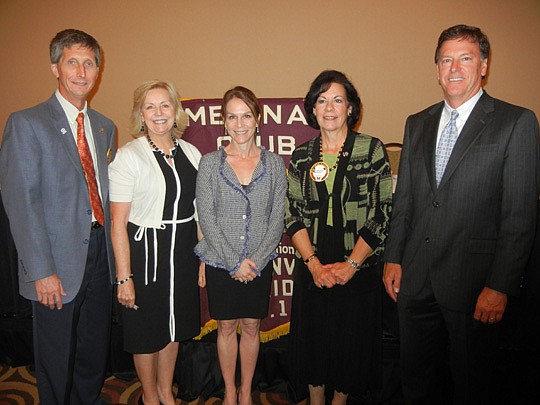
Health care professionals representing the nursing, hospital and insurance industries seemed to agree Monday the eventual impact of the Affordable Care Act won't be known for some time.
Each panelist participating in the Meninak Club of Jacksonville forum to discuss the health care law talked briefly about how the act will affect his or her industry or patients.
The act is the federal comprehensive health care reform law enacted in March 2010.
The healthcare.gov website explains it was enacted in two parts. The Patient Protection and Affordable Care Act was signed into law on March 23, 2010, and was amended by the Health Care and Education Reconciliation Act on March 30, 2010.
The name "Affordable Care Act" is used to refer to the final, amended version of the law. It is being rolled out.
Pam Chally, dean and professor at the University of North Florida Brooks College of Health, said she tends to refer to the law as "the accountable care act."
"We all hope we will be accountable as we become affordable," she told the almost 60 club members and guests attending the event at the Wyndham on the Southbank.
Chally said the law attempts to deal with four major problems: Give Americans greater access to health care, specifically the more than 40 million Americans without health insurance; reduce the costs of health care; add more consumer benefits; and emphasize prevention.
Chally said the act includes new mechanisms to deliver health care and improve efficiency.
She said the law will increase the need for nurses, "especially in terms of working with prevention and wellness."
Chally said UNF will study ways to increase the number and quality of the nurse practitioners the college educates.
Doug Baer, president and CEO of Brooks Rehabilitation, said from a health care provider's standpoint, it is a scary and challenging time.
He said demand for health care has been increasing as the population ages and technology improves.
Baer said medical procedures had been paid based on quantity, but the act changes that "to reimbursement based on value" and on health care outcomes.
The Affordable Care Act encourages more coordination among health care providers, he said.
Before, the transfer of information about a patient's health care event was not very good, he said.
Baer said a new delivery model, "bundled payments," is being tested. Health care providers are paid a lump sum for an episode (a hip fracture, for example) for a specific period.
"The provider is responsible for outcomes and resources," he said.
That means physicians, hospitals and home-health care providers share in the bundled payment.
He talked about another test model and other changes.
"There are lots of challenges but it can be good for patients," Baer said.
Baer also talked about Medicaid expansion and that the Florida Legislature has not agreed to adopt that part of the Affordable Care Act.
As Bloomberg.com reported, under the health care law, the state would receive about $51 billion in federal money in the next 10 years to expand Medicaid by raising income eligibility limits to a higher percentage of the federal poverty level.
State lawmakers adjourned last month without agreeing on a proposal that would extend Medicaid coverage to low-income residents without adequate health care, Bloomberg said.
"We advocate strongly that we do expand the Medicaid program," Baer said. "We hope Florida ultimately will expand the Medicaid program."
Gov. Rick Scott and some influential business groups backed the move to expand.
Dr. Elana Schrader, Florida Blue vice president of marketing and employer markets, said she refers to health care reform as "the law."
She said it's a 950-page law with an additional 2,000 pages of rules and regulations.
"We are still receiving rules and regulations," she said.
Schrader talked about changes in insurance costs and requirements affecting individuals, small employers and large employers.
"It's very hard for a patient or consumer to go through the health care system and have a seamless experience. It's fragmented," she said.
Schrader said everyone needs to contribute to the "fixes."
She called the 950-page law "a start."
"It starts the dialogue we need to have," she said.
@MathisKb
(904) 356-2466